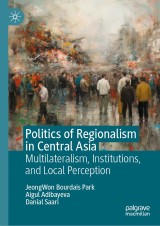Details

Politics of Regionalism in Central Asia
Multilateralism, Institutions, and Local Perception|
CHF 142.00 |
|
| Verlag: | Palgrave Macmillan |
| Format: | |
| Veröffentl.: | 11.08.2023 |
| ISBN/EAN: | 9789819940790 |
| Sprache: | englisch |
Dieses eBook enthält ein Wasserzeichen.
Beschreibungen
This book addresses how to mitigate regional tensions and enhance cooperative opportunities through well-designed regional institutions and organizations among countries in geographical proximity. We use the case of Central Asia (i.e., Kazakhstan, Kyrgyzstan, Tajikistan, Turkmenistan, and Uzbekistan) to employ our conceptual framework of ‘externally guided regionalism.’ The following questions guide the study: How and by what forces has Central Asian regionalism evolved, and what are the main characteristics and political implications of the continuously evolving regional institutions? We discuss not only the extra-regional influential actors (i.e., Russia, the United States, the European Union, and China), but also intra-regional initiatives, strategies, and struggles in securing stability and sovereignty. Extra-regional actors’ growing competition over molding their own kind of multilateralism involving this region has contributed to the current direction of Central Asia’s regionalization. Concurrently, Central Asia’s political conditions and constraints interactively contribute to ever-increasing institutional sprawl.<p></p><p></p>
Chapter 1: Introduction.- Chapter 2. De-Sovietization and collective identity building.- Chapter 3. External influences on regionalization.- Chapter 4. Authoritarian turn and revival of Central Asian regionalization.- Chapter 5: Conclusion.
<p><b>JeongWon Bourdais Park</b> is an Associate Professor of Political Science and International Relations at the University of Nottingham, Ningbo, China. She teaches International Organization, Comparative Politics, and Public Policy and publishes widely on regional security, nuclear politics, political communication, and global environmental politics.</p><p></p><p><b>Aigul M. Adibayeva</b> is an Assistant Professor in the Department of International Relations and Regional Studies and Associate Dean of the College of Social Sciences at KIMEP University, Almaty, Kazakhstan. Her publications are in the areas of Central Asian studies and the political history of Kazakhstan since the country’s independence from the Soviet Union.</p><p><b>Danial Saari</b> is a Professor of Practice and Head of Political Studies at the Center of the School of Politics and Law at Almaty Management University, Almaty, Kazakhstan. His main research fields are foreign policy analysis, regional studies, international business, and world history focusing on Central Asian countries.</p><br>
<div>This book addresses how to mitigate regional tensions and enhance cooperative opportunities through well-designed regional institutions and organizations among countries in geographical proximity. We use the case of Central Asia (i.e., Kazakhstan, Kyrgyzstan, Tajikistan, Turkmenistan, and Uzbekistan) to employ our conceptual framework of ‘externally guided regionalism.’ The following questions guide the study: How and by what forces has Central Asian regionalism evolved, and what are the main characteristics and political implications of the continuously evolving regional institutions? We discuss not only the extra-regional influential actors (i.e., Russia, the United States, the European Union, and China), but also intra-regional initiatives, strategies, and struggles in securing stability and sovereignty. Extra-regional actors’ growing competition over molding their own kind of multilateralism involving this region has contributed to the current direction of Central Asia’s regionalization. Concurrently, Central Asia’s political conditions and constraints interactively contribute to ever-increasing institutional sprawl. <p></p><p><b>JeongWon Bourdais Park</b> is an Associate Professor of Political Science and International Relations at the University of Nottingham, Ningbo, China. She teaches International Organization, Comparative Politics, and Public Policy and publishes widely on regional security, nuclear politics, political communication, and global environmental politics.</p><p></p>
<p><b>Aigul M. Adibayeva</b> is an Assistant Professor in the Department of International Relations and Regional Studies and Associate Dean of the College of Social Sciences at KIMEP University, Almaty, Kazakhstan. Her publications are in the areas of Central Asian studies and the political history of Kazakhstan since the country’s independence from the Soviet Union. </p>
<p><b>Danial Saari</b> is a Professor of Practice and Head of Political Studies at the Center of the School of Politics and Law at Almaty Management University, Almaty, Kazakhstan. His main research fields are foreign policy analysis, regional studies, international business, and world history focusing on Central Asian countries. </p></div>
<p><b>Aigul M. Adibayeva</b> is an Assistant Professor in the Department of International Relations and Regional Studies and Associate Dean of the College of Social Sciences at KIMEP University, Almaty, Kazakhstan. Her publications are in the areas of Central Asian studies and the political history of Kazakhstan since the country’s independence from the Soviet Union. </p>
<p><b>Danial Saari</b> is a Professor of Practice and Head of Political Studies at the Center of the School of Politics and Law at Almaty Management University, Almaty, Kazakhstan. His main research fields are foreign policy analysis, regional studies, international business, and world history focusing on Central Asian countries. </p></div>
This book provides an in-depth ethnographical analysis of the particular features of Central Asian regionalism Explores de-Sovietization, external power engagement, and institutional sprawl in Central Asia Offers critical analysis of unique regional regionalism by examining feasibility of intra-regional cooperation
“The excellence of thorough inquisitiveness is the phrase apposite to describe the book <i>Politics of Regionalism in Central Asia</i>. A region of great geopolitical importance is no longer ‘understudied’. Through an arduous analytical approach embedded in a variety of International Relations theories and concepts, the authors have succeeded in capturing the attention of their readers to internal and external influences that shape regional cooperation amongst Kazakhstan, Kyrgyzstan, Uzbekistan, Turkmenistan and Tajikistan. Interested readers, students, politicians and diplomats will benefit from this book on where the Central Asian region stands in terms of regional cooperation and where it can, should or shouldn’t go.” (Dr. Joost Herman, University of Nottingham Ningbo, China)<p></p>
Diese Produkte könnten Sie auch interessieren:

Herausforderungen und Chancen eines künstlerischen Wettbewerbs für ein Mahnmal in Gedenken an die Opfer des 19. Februar 2020 in Hanau

von: Katharina Meyer zu Eppendorf

CHF 30.00















